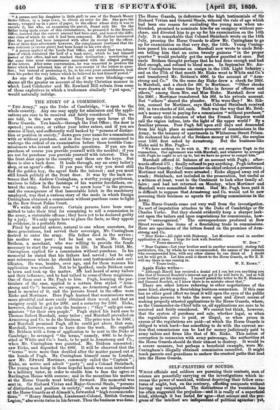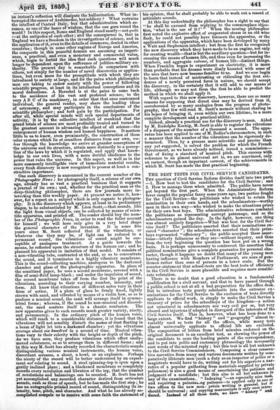SELF-PRINTING OF SOUNDS.
WHILE officials and soldiers are pursuing their contests, men of science are peacefully carrying on the investigations which in- crease the power of mankind, without depriving their fellow crea- tures of aught, but, on the contrary, effecting conquests without leaving any vanquished. The distinctness of the vocations has too often suggested the prejudice—and it is really of a superficial kind, although it has lasted for ages—that science and the pro- gress of the intellect are independent of political ageneies: yet, an instant's reflection will dissipate the hallucination. What in- terrupted the career of Archimedes, but soldiery ? What restrains the intellect of Central Italy, but that administration which as- sumes, as one of the bases of wisdom, that the sun goes round the world ? In this respect, Rome and England stand nearly—not quite —at the antipodes of each other ; and the consequence is, that in England we have a freedom in the investigations of science, and in the application of it, even to the details of commerce, denied in other countries ; though in some other regions of Europe and America, the conquests in this peaceful domain are assuming an import- ance, a practical, and even a monetary and commercial value, which, begin to forbid the idea that such questions will much longer be dependent upon the sufferance of politico-military au- thority. The present day is remarkable in comparison with others, not simply for the number of novel discoveries or applica- tions, but even more for the promptitude with which they are introduced to society at large, and for the pains which philosophic men are taking to endow society with the power of following scientific progress, at least in its intellectual conceptions and its moral deductions. A Herschel is at the pains to come back to the accidence of his vast and profound science; to the very A B C of its machinery, in order that that once contemned individual, the general reader, may share the leading ideas of astronomy, and may participate in the conclusions of the scientific philosopher ; and both gain by the participation. For after all, while special minds will seek special departments of activity, it is by the collective intellect of mankind that the grand totals of science are most profitably treated and turned to the greatest account in advancing the object of all science—the enlargement of human wisdom and human happiness. It matters little to us to know, even proximately, the construction of those solar systems which lie at countless distances from our own, un- less through the knowledge we arrive at grander conceptions of 'the universe and its structure, attain more distinctly to a percep- tion of the laws by which it is regulated, and apply that know- ledge in our own lives, with a more dutiful obedience to the power that rules the universe. In this aspect, as well as in the more commonly intelligible view of immediate material results, every fresh discovery is now recognized to possess at least a con- structive importance.
One such discovery is announced in the current number of the Photographic News ; for photography itself, a science of our own ag.e, already has so vast a practical business that it supports a journal of its own ; and, whether for the practical man or the -deep-thinking philosopher, there are few journals more in- teresting than this weekly paper. At present we notice it, how- ever, for a report on a subject which is only cognate to photogra- phy. It is the discovery which appears, at least in its preliminary stages, to be substantiated by M. Leon Scott,—that sounds, like the light from visual objects, can be collected by means of scien- tific apparatus, and printed off. The reader should buy the num- ber of the Photographic News, in order to read the fuller account for himself ; we will here only give in a very brief shape
the general character of the invention. It is some five years since M. Scott reflected that if the vibrations, or whatever else they may be, of light can be reduced to a permanent record, the vibrations of sound might be sus- ceptible of analogous treatment. As a guide towards the means, he reflected upon the structure of the human ear ; and he planned his apparatus in imitation of that model. It consists of a non-vibrating tube, contracted at the end, so as to concentrate the sound, and it terminates in a highly vibratory membrane. This is the sound-collecting machine, analogous to the darkened chamber and glass of the photographic apparatus. In place of the sensitized paper, he uses a second membrane, covered with a film of semi-fluid lamp-black ; and under the impulsion of sound, the second membrane takes off from the first the print of the vibrations, according to their varying number, intensity, and form. All know that vibrations of different notes vary in their form of action. If a plate of glass be firmly fixed, lightly strewn with sand, and vibrated by means of a violin bow, so as to produce a musical sound, the sand will arrange itself in symme- trical forms ; whereas, if the sound be non-musical and discord-
ant, the sand scatters itself in a chaotic confusion. The new apparatus gives to such records much greater variety, nicety, and permanency. In the ordinary pitch of the human voice, which will reach to a considerable distance, it is found that the vibrations will not sensibly disturb the motes of dust floating in a beam of light let into a darkened chamber ; yet the vibrations average about six hundred in a second of time. Musical vibra- tions vary in their celerity with the height or depth of the pitch. As we have seen, they produce vibrations which effect easily- moved substances, so as to arrange them in different forms ; and in this way M. Scott has already recorded the characteristic sounds distinguishing various musical instruments, the human voice, discordant screams, a shout, a howl, or an explosion. Perhaps the nicety of the record will be better understood by an experi- ment not relating to sound. A steel spinning-top is spun upon a gently inclined plane ; and a blackened membrane so completely records every revolution and libration of the top, that the number of revolutions and balancings can be counted. M. Scott has not yet accomplished any recorded character derived from articulate sounds, such as those of speech, but he has made the first step ; he has an autographic printed record of sound, distinguishing its in- tensity, tone, pitch, and character. And what he has already ac- complished compels us to receive with some faith the statement of
his opinion, that he shall probably be able to work out a record of articulate sounds.
At this day undoubtedly the philosopher has a right to say that "he shall be excused from replying to the commonplace objec- tion, what is the use of it ? ' " When the musing philosopher first noted the explosive effect of evaporated steam in an old wine flask, he could not possibly have foreseen the apparatus, or the applications of the apparatus, which have been developed by many a Watt and Stephenson intellect; but from the first he recognized the new discovery which they have made to be an engine, not only for creating wealth—that is but the auxiliary question—but for in- creasing the means of human life, and thus even for increasing the numbers, and aggregate volume, of human life—distinct things. When Franklin began to experiment on electricity, it is more than probable that his dreams were dimly haunted with some of the uses that have now become familiar to us. And we now begin to learn that instead of mistrusting or ridiculing the first evi- dences of a newly perceived force in nature, we should accept the discovery, in the certainty that it will add to our means of life, although we may not from the first be able to predict the method in which we shall apply it.
With regard to this new discovery, however, there are so many reasons for supposing that direct uses may be derived from it, corroborated by so many analogies from the progress of photo- graphy, that few will read M. Scott's memoir without sharing in his hopes of bringing it, even within our own lifetime, to a more complete development and a practical utility. Indeed, already a practical use for the discovery is seen. Aided by M. Rodolphe Koenig, M. Scott is able to register the vibrations of a diapason of the number of a thousand a second. The appa- ratus has been applied to one of M. Redier's chronometers, in such a manner that the number of the vibrations can be rigorously de- termined. Thus, by a process more scientific and precise than any yet suggested, is solved the problem for which the French Government, as we have already noticed, issued a commission— that of fixing a standard of musical pitch. This success with reference to an almost universal art is, we are convinced, only an earnest, though an important earnest, of the achievements in which M. Scott has made the first practical beginning.



























 Previous page
Previous page